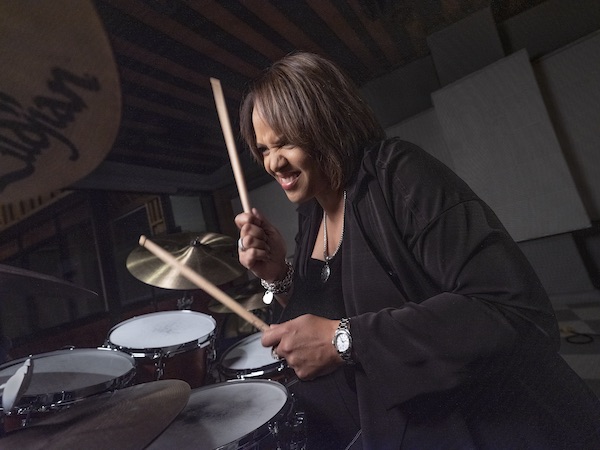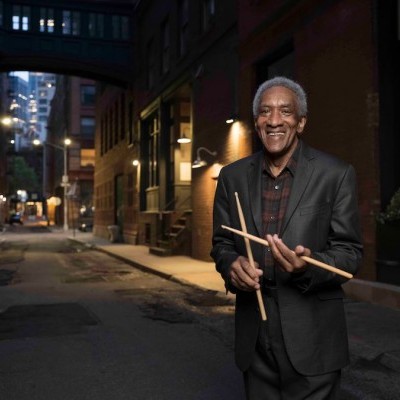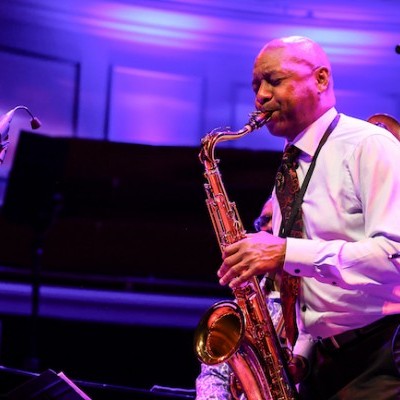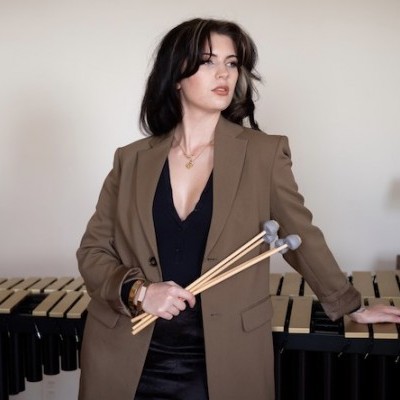Jun 3, 2025 11:25 AM
In Memoriam: Al Foster, 1943–2025
Al Foster, a drummer regarded for his fluency across the bebop, post-bop and funk/fusion lineages of jazz, died May 28…

Terri Lyne Carrington, seen here in New York at Power Station at BerkleeNYC, is the first female instrumentalist to top the Jazz Artist category in the DownBeat Critics Poll.
(Photo: Jimmy & Dena Jatz)The global protests following the Memorial Day killing of George Floyd in Minneapolis might yet herald important social change. But the demonstrations are, in a sense, only the latest reaction to an unchanging problem: police slayings of Black people, among them another Minneapolis-area resident, Philando Castile.
Castile’s killing, on July 6, 2016, sparked numerous protests—one of which arguably came in the form of lyrics by Terri Lyne Carrington, who was motivated to write “Bells (Ring Loudly),” a resounding indictment of police brutality that echoes throughout her latest album, Waiting Game (Motéma).
“This is ‘Bells’ all over again,” Carrington lamented in an early-June conversation via Zoom from her home in Woburn, Massachusetts, where she was holed up because of the coronavirus pandemic.
Like many tunes on Waiting Game, “Bells” is a multilayered affair that, in its complexity, mirrors this moment of multiple crises. On one level, it involves synchronizing Carrington’s sung lyrics (“You took my love away, from me/ I want to know, how did it feel to watch him tremble and bleed?”) with actor Malcolm-Jamal Warner’s spoken words (“Bells, sirens swell, morphing into church bells/ Signaling another unjustifiable death”).
On another level, the track involves integrating the input of instrumentalists, each of whom has a rich musical palette. Crucially, their contributions are spare and offered with humility, filling the available spaces with small sonic touches—a texture here, a color there—rather than thick brushstrokes that might obscure the message.
Ultimately, the message is conveyed with great clarity. And that, Carrington said, owes in no small measure to the matching of messenger and moment: Her band, Social Science, is a disparate sextet united by an inclusive ethos, reflecting the collective mindset of the diverse crowds protesting in the streets around the world.
“Now that we see the movement and the makeup of it,” she said, “I think the band is representative of the times and where we’re at.”
Formed as a means of marrying art and activism after the 2016 presidential election, Social Science—Aaron Parks, 36 (piano and keyboards), Matthew Stevens, 38 (guitar), Morgan Guerin, 21 (saxophone and bass), Debo Ray, 29 (vocals) and Kassa Overall, 38 (turntables and vocals)—has generated widespread acclaim.
In the 2020 DownBeat Critics Poll, Social Science topped the Jazz Group category, and Waiting Game, its debut recording, was voted Jazz Album of the Year. Carrington won the Jazz Artist of the Year category in the poll, becoming the first female instrumentalist to do so.
The project marks a high point in her career, which includes time spent as a wunderkind with the late trumpeter Clark Terry, as a 20-something member of bands led by Wayne Shorter and Herbie Hancock, and as a stalwart of TV and recording studios, wielding her sticks as a first-call drummer—one of the few women in that coveted position.
A lingering sense of urgency regarding the disparity became a call to action, inspiring Carrington, 54, to broaden her roles as an educator, advocate and producer. “I’m concerned with making up for lost time,” she said. “How many years I went along with playing drums. I just lived it without doing all that I could. I allowed people to look at me as an exception, and that’s not good.”
These days, she’s certainly doing a lot of good—not least in her work as founder and director of the Berklee College of Music’s Institute of Jazz and Gender Justice. Given the demands of that role, her recent accolades are particularly salient.

Foster was truly a drummer to the stars, including Miles Davis, Sonny Rollins and Joe Henderson.
Jun 3, 2025 11:25 AM
Al Foster, a drummer regarded for his fluency across the bebop, post-bop and funk/fusion lineages of jazz, died May 28…

“Branford’s playing has steadily improved,” says younger brother Wynton Marsalis. “He’s just gotten more and more serious.”
May 20, 2025 11:58 AM
Branford Marsalis was on the road again. Coffee cup in hand, the saxophonist — sporting a gray hoodie and a look of…

“What did I want more of when I was this age?” Sasha Berliner asks when she’s in her teaching mode.
May 13, 2025 12:39 PM
Part of the jazz vibraphone conversation since her late teens, Sasha Berliner has long come across as a fully formed…

Roscoe Mitchell will receive a Lifetime Achievement award at this year’s Vision Festival.
May 27, 2025 6:21 PM
Arts for Art has announced the full lineup for the 2025 Vision Festival, which will run June 2–7 at Roulette…

Benny Benack III and his quartet took the Midwest Jazz Collective’s route for a test run this spring.
Jun 3, 2025 10:31 AM
The time and labor required to tour is, for many musicians, daunting at best and prohibitive at worst. It’s hardly…